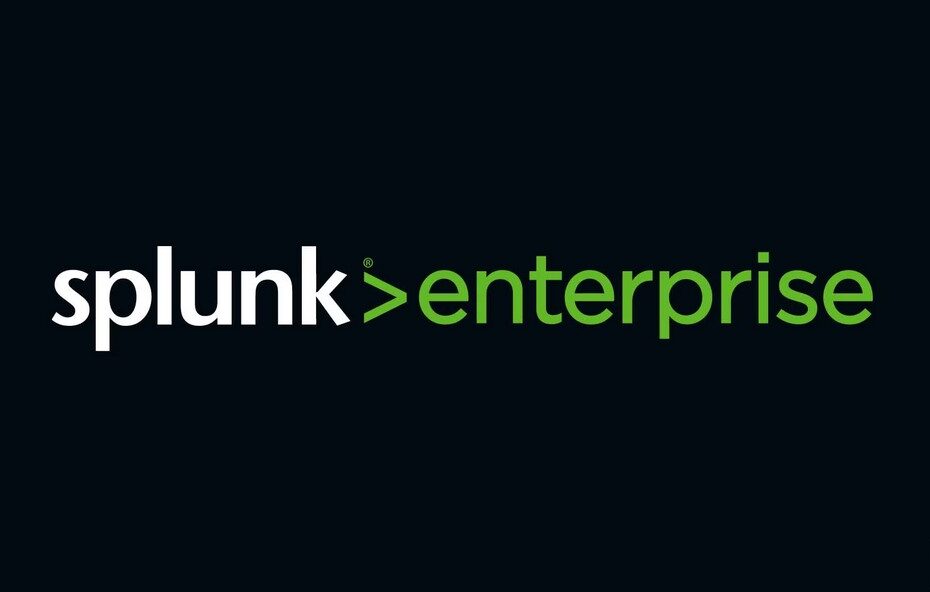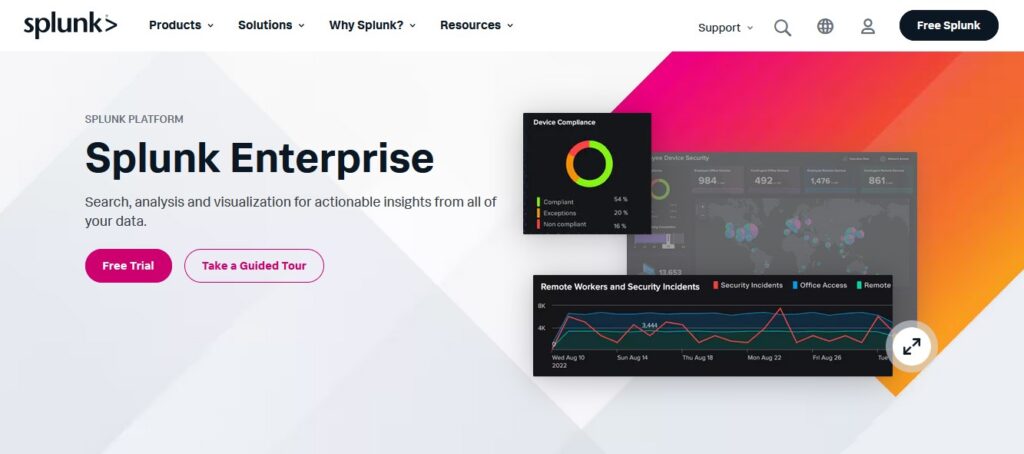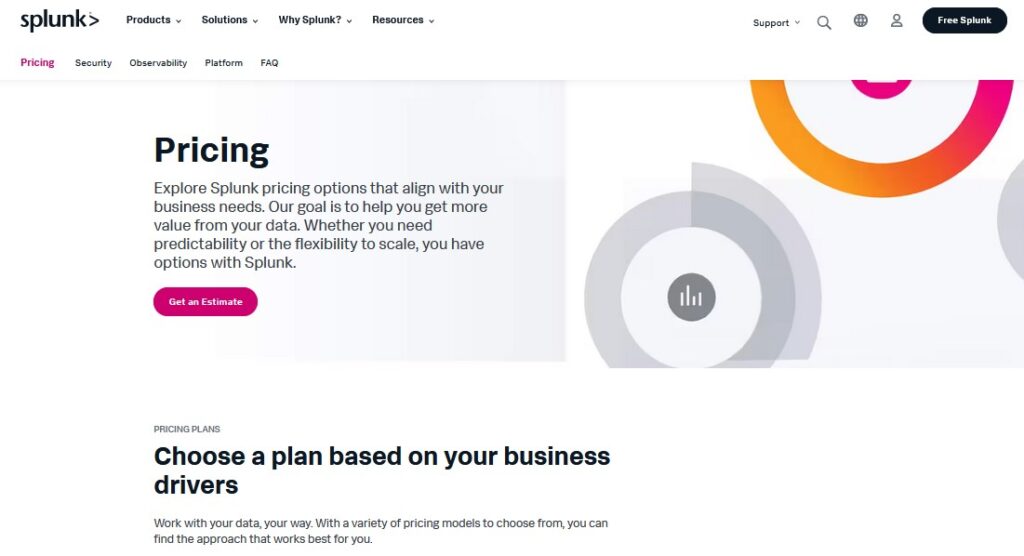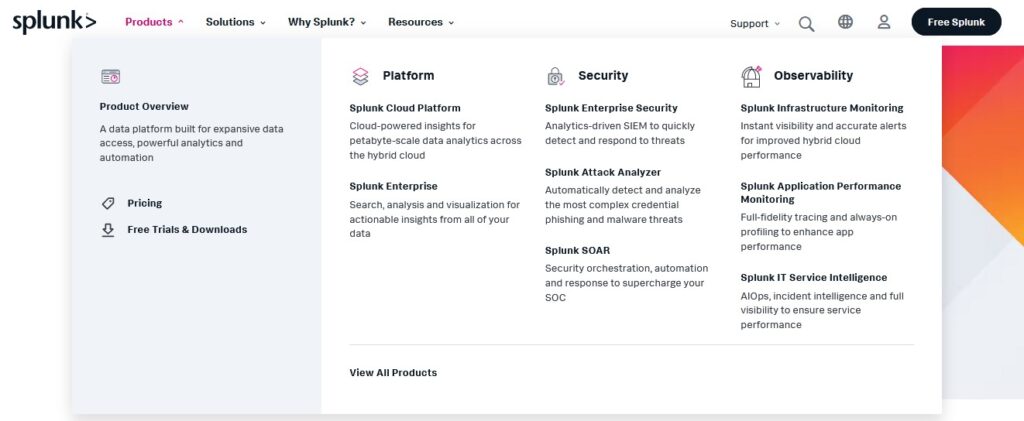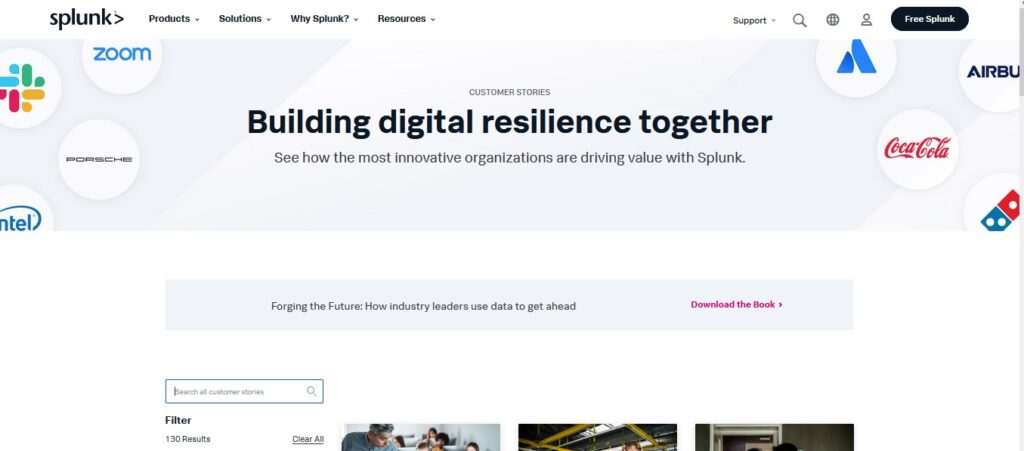As a business owner, I have spent countless hours researching and analyzing various tools and platforms to streamline our operations. When it comes to data analysis and monitoring, Splunk Enterprise has been a top contender due to its robust features and intuitive interface. However, the pricing model has been a significant consideration in our decision-making process. Splunk Enterprise offers flexible pricing options based on the volume of data indexed per day, making it suitable for businesses of all sizes. This scalable approach allows us to control costs while still accessing the advanced features that are essential for our CRM and customer data management.
The feature set of Splunk Enterprise is truly impressive, offering real-time insights into our customer behavior, application performance, security threats, and more. The ability to create customizable dashboards and reports has significantly enhanced our decision-making processes and allowed us to proactively address potential issues before they impact the customer experience. In addition to these features, Splunk Enterprise receives consistently positive reviews from users across various industries. Many praise its flexibility, scalability, and ease of use as key factors in their success with the platform.
While Splunk Enterprise is undoubtedly a powerful tool for CRM-related data analysis, it’s important to explore alternatives that may better suit the unique needs of your business. Other platforms such as Tableau CRM (formerly Einstein Analytics), Microsoft Power BI, or even open-source solutions like Elastic Stack offer similar capabilities with varying cost structures and feature sets.
Overview of Splunk Enterprise
Splunk Enterprise is a powerful software platform designed to help organizations gain valuable insights from their machine-generated data. It serves as a comprehensive tool for collecting, analyzing, and visualizing data from various sources, providing businesses with an unparalleled level of operational intelligence. With its user-friendly interface and robust features, Splunk Enterprise offers an effective solution for managing the vast amounts of data generated by modern enterprises. From IT operations to security and compliance, Splunk Enterprise enables organizations to harness the power of their data to drive informed decision-making.
One particular area where Splunk Enterprise can be especially beneficial is in customer relationship management (CRM). By integrating CRM systems with Splunk’s platform, businesses can leverage real-time analytics to gain deep insights into customer behavior, preferences, and interactions. This allows companies to proactively identify trends, patterns, and opportunities that can enhance their customer engagement strategies. With its ability to centralize and analyze diverse sets of data related to customer interactions across multiple channels, Splunk Enterprise empowers organizations with the tools they need to deliver personalized experiences and build lasting relationships with their customers.
Overall, Splunk Enterprise provides a holistic approach to managing and making sense of complex data landscapes within modern enterprises. Its capabilities extend beyond traditional business intelligence tools by offering real-time visibility into operational performance across various departments. By embracing the potential of Splunk Enterprise in areas such as CRM, organizations can position themselves at the forefront of leveraging actionable insights from customer data while driving continuous improvement in their relationships with clients.
Splunk Enterprise is a powerful platform that allows organizations to collect, analyze, and visualize machine-generated data. It provides a comprehensive solution for monitoring, searching, and analyzing large volumes of data from various sources such as servers, applications, and network devices.
With its user-friendly interface and robust search capabilities, Splunk Enterprise enables users to gain valuable insights into their data in real-time. Its ability to index and correlate data from diverse sources makes it a valuable tool for IT operations, security monitoring, and business analytics. Additionally, Splunk Enterprise offers customizable dashboards and reports that help organizations make informed decisions based on the analysis of their data.
Overall, Splunk Enterprise is a versatile solution that empowers organizations to harness the power of their machine-generated data for operational intelligence, security monitoring, and business analytics. Its flexibility and scalability make it a popular choice for businesses looking to gain actionable insights from their data in real-time.
Splunk Enterprise Pricing: Cost structure and available plans
Splunk Enterprise offers a variety of pricing options to accommodate different business needs. The cost structure is typically based on the volume of data ingested and indexed per day, with pricing tiers available for different levels of usage. Additionally, there may be additional costs for features like advanced analytics, machine learning, and premium support.
As for available plans, Splunk Enterprise provides both perpetual and term-based licensing options. Customers can choose from self-managed or cloud-based deployment models, with the flexibility to scale up or down as needed. Splunk also offers enterprise-wide agreements and custom pricing for large organizations with complex requirements.
Overall, Splunk Enterprise pricing is designed to be flexible and scalable to meet the diverse needs of businesses across various industries. It’s important for potential customers to engage directly with Splunk sales representatives to discuss their specific requirements and determine the most suitable pricing plan for their organization.
Splunk Enterprise pricing is a crucial consideration for businesses looking to utilize its powerful data analysis and monitoring capabilities. The cost structure of Splunk Enterprise is based on data volume, with different pricing tiers available to accommodate varying levels of data ingestion. Small businesses can opt for the free version with limited features, while larger enterprises can choose from several paid plans that scale according to their needs. This flexible approach allows organizations to align their investment in Splunk Enterprise with their specific requirements and budget.
When evaluating the available plans, it’s important to consider the potential return on investment (ROI) that Splunk Enterprise offers. The platform’s ability to centralize and analyze vast amounts of machine-generated data can significantly enhance operational efficiency, identify security threats, and improve customer relationship management (CRM). As such, the cost of implementing Splunk Enterprise should be weighed against the long-term value it brings in terms of business insights and competitive advantage. By leveraging its comprehensive CRM capabilities, businesses can gain deeper insights into customer behavior, preferences, and interactions across various touchpoints.
In conclusion, understanding the cost structure and available plans for Splunk Enterprise is essential for making informed decisions about integrating this robust tool into an organization’s technology stack. With its focus on scalability and customization, Splunk Enterprise offers a valuable solution for managing complex CRM processes and unlocking actionable business intelligence from diverse datasets. By carefully assessing pricing options in alignment with specific business needs, companies can harness the full potential of Splunk Enterprise without overextending their resources.
Splunk Enterprise Features: Key functionalities and capabilities
Splunk Enterprise is a powerful platform that offers key functionalities and capabilities designed to revolutionize the way businesses manage their data. One of its standout features is the ability to collect, index, and analyze massive amounts of data from various sources in real time. This enables organizations to gain deep insights into their operational activities and customer interactions, making it an ideal tool for CRM (Customer Relationship Management). With its intuitive user interface and customizable dashboards, Splunk Enterprise empowers users to visualize complex data sets and derive meaningful conclusions that can enhance customer relationships.
Moreover, the platform’s machine learning capabilities enable it to predict future trends and patterns based on historical data, allowing businesses to proactively address customer needs and preferences. In addition, Splunk Enterprise’s alerting system provides timely notifications about critical events or anomalies within CRM systems, ensuring that potential issues are identified and resolved promptly. Furthermore, the platform’s seamless integration with other business applications such as Salesforce enables a holistic view of customer interactions across different touchpoints, facilitating personalized engagement strategies. Overall, Splunk Enterprise’s comprehensive suite of features makes it an indispensable tool for businesses looking to elevate their CRM initiatives through advanced data analytics and actionable insights.
In conclusion, Splunk Enterprise stands out as a game-changer in the realm of CRM with its robust set of features tailored towards effective data management and analysis. Its real-time data monitoring capabilities along with predictive analytics empower organizations to make informed decisions that can drive customer satisfaction and loyalty.
Splunk Enterprise Reviews: User feedback and satisfaction ratings
Splunk Enterprise has received overwhelmingly positive reviews from users, showcasing high levels of satisfaction and effectiveness as a CRM tool. User feedback consistently highlights the platform’s intuitive interface, robust features, and seamless integration capabilities. Many users have praised Splunk Enterprise for its ability to centralize and analyze vast amounts of data, providing valuable insights that drive informed decision-making and enhance customer interactions. The platform’s user-friendly nature has been particularly lauded, enabling even non-technical individuals to leverage its powerful analytics and reporting tools.
Furthermore, the satisfaction ratings for Splunk Enterprise are reflective of its impact on business operations. Users have expressed how the platform has significantly improved their ability to streamline customer relationship management processes, leading to more efficient workflows and increased productivity. Additionally, the reliability and performance of Splunk Enterprise have garnered commendation, with many users citing its stability and responsiveness as major contributing factors to their overall satisfaction. Ultimately, the overwhelmingly positive user feedback and satisfaction ratings underscore Splunk Enterprise’s effectiveness as a top-tier CRM solution that delivers tangible value to businesses across various industries.
Splunk Enterprise Alternatives: Comparison with similar tools
When it comes to Splunk Enterprise alternatives, there are several comparable tools in the market that cater to different business needs. One such alternative is Salesforce CRM, which offers a comprehensive suite of customer relationship management tools for businesses of all sizes. While Splunk excels in data analysis and visualization, Salesforce CRM focuses on managing customer interactions and streamlining sales processes. This key difference makes Salesforce CRM a strong alternative for companies looking to prioritize customer relationship management over data analysis.
Another alternative worth considering is HubSpot CRM, which provides a user-friendly interface and powerful automation features for managing marketing, sales, and customer service operations. In comparison to Splunk Enterprise, HubSpot CRM offers a more streamlined approach to handling customer data and interactions through its intuitive dashboard and integrations with various marketing platforms. Additionally, HubSpot’s emphasis on inbound marketing and lead nurturing sets it apart from Splunk’s core focus on log management and troubleshooting. Ultimately, evaluating these alternatives alongside Splunk Enterprise can help businesses determine which tool aligns best with their specific business objectives and operational needs.
Conclusion
In conclusion, Splunk Enterprise offers a robust and feature-rich platform for businesses looking to gain valuable insights from their data. With its powerful search and analysis capabilities, real-time monitoring, and extensive integration options, Splunk Enterprise stands as a top choice for organizations seeking to harness the full potential of their data. While it’s important to consider the pricing structure and potential costs associated with scaling up, the investment in Splunk Enterprise can yield significant returns in terms of operational efficiency, security enhancements, and overall business intelligence.
Furthermore, as seen from user reviews and industry feedback, Splunk Enterprise consistently proves its value by empowering businesses to make informed decisions based on actionable insights. For those seeking alternatives or supplemental tools to complement Splunk Enterprise’s functionalities, exploring integrations with complementary solutions such as machine learning platforms or cloud-based analytics tools can further enhance the data processing capabilities. Overall, the diverse range of features combined with the flexibility to adapt to varying business needs positions Splunk Enterprise as a formidable player in the realm of data analytics and management.
